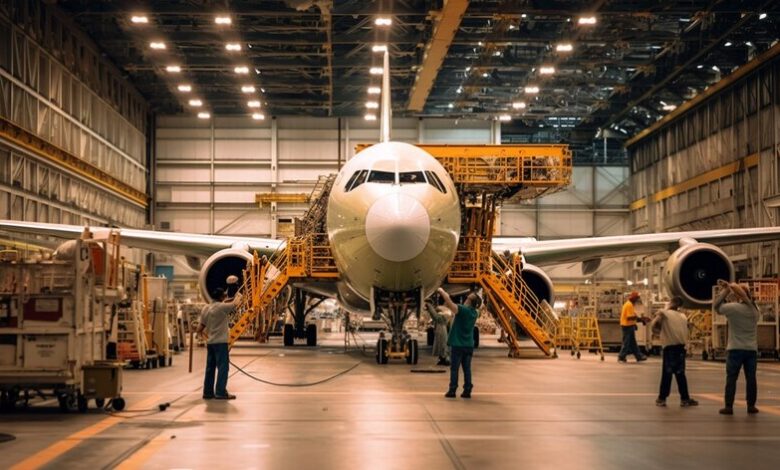Reach New Heights: AS9100 Certification for Aerospace Innovation

I. Introduction
A. Brief overview of AS9100 Certification
AS9100 Certification is a set of international standards specifically designed for the aerospace industry. It is based on the ISO 9001 quality management system but includes additional requirements that are crucial for ensuring the safety, reliability, and regulatory compliance of aerospace products and services. The certification covers various aspects, including design, production, testing, and maintenance, to guarantee that organizations in the aerospace sector adhere to rigorous quality standards.
B. Importance of certification in the aerospace industry
AS9100 Certification holds paramount importance in the aerospace industry due to the complex and safety-critical nature of aerospace products. Compliance with these standards not only ensures the quality and reliability of aerospace components and systems but also demonstrates a commitment to meeting regulatory requirements. In an industry where precision and safety are non-negotiable, AS9100 Certification serves as a benchmark for organizations to establish and maintain a robust quality management system.
C. Significance of Innovation in Aerospace
Innovation is a driving force in aerospace, transforming travel, exploration, and communication. Its importance lies in developing cutting-edge technologies for efficient aircraft and spacecraft performance. Additionally, innovation addresses environmental concerns with sustainable and fuel-efficient solutions. It is crucial for global competitiveness, economic growth, and fostering collaboration. Beyond AS9100 compliance, organizations must actively embrace innovation to stay at the forefront of technological advancements in the evolving aerospace industry.
II. Understanding AS9100 Certification
A. Definition and Purpose of AS9100
AS9100 is a set of international standards specifically crafted for the aerospace industry. It builds upon the ISO 9001 quality management system, incorporating additional requirements tailored to the unique needs of aerospace organizations. The primary purpose of AS9100 is to establish a comprehensive framework that ensures the quality, safety, and reliability of aerospace products and services throughout their lifecycle.
B. Key Requirements and Standards
AS9100 encompasses key requirements and standards that cover various aspects of aerospace operations. These include stringent criteria for design, production, testing, and maintenance. The standards are designed to guarantee that organizations in the aerospace sector meet the highest quality benchmarks, adhere to regulatory requirements, and continuously improve their processes.
III. The Journey to Certification
A. Steps Involved in Obtaining AS9100 Certification
- Commitment and Planning: Organizations must express a dedicated commitment to meeting AS9100 standards and establish a comprehensive plan for the certification process, emphasizing clear communication and involvement of all relevant stakeholders.
- Gap Analysis: Conduct a thorough evaluation of current practices against AS9100 requirements to identify gaps and areas for improvement, laying the foundation for targeted and effective corrective actions.
- Documentation: Develop and document a robust quality management system that aligns with AS9100 standards, covering aspects such as design, production, testing, and maintenance, ensuring clarity, accessibility, and compliance.
- Implementation: Execute the planned changes to align the organization with AS9100 standards, incorporating best practices for quality management, and fostering a seamless transition through effective change management strategies.
B. Challenges and considerations during the process
- Resource Allocation: Adequate resources, both human and financial, are essential for successful implementation and certification. Allocating skilled personnel and sufficient budgetary support ensures a smooth and effective journey towards AS9100 Certification.
- Cultural Shift: Ensuring that employees embrace and adapt to the changes required by AS9100 standards may pose a cultural challenge. Leadership involvement, effective communication, and fostering a culture of quality are pivotal in overcoming resistance and fostering a positive organizational shift.
- Complexity: The aerospace industry’s complexity can make compliance challenging, requiring a meticulous approach to documentation and implementation. Thorough understanding of industry intricacies and collaboration across departments are crucial to navigate through the intricacies of AS9100 standards effectively.
IV. Impact on Aerospace Innovation
A. How AS9100 Certification Promotes a Culture of Innovation
AS9100 Certification drives an innovation-focused culture in aerospace organizations. By emphasizing rigorous standards and continuous improvement, it encourages proactive problem-solving and the adoption of cutting-edge technologies. The certification process itself prompts a critical examination of practices, creating opportunities for innovation in efficiency, safety, and overall quality. Commitment to these high standards instils a mind-set valuing creativity and excellence, fostering advancements in aerospace technologies.
B. Integration of Quality Management with Innovative Practices
Integrating quality management with innovation is essential for organizational excellence. AS9100 Certification, along with innovative approaches, enhances product and service quality systematically. This synergy ensures compliance with industry standards while driving continual improvement. By marrying quality management with innovation, organizations cultivate a culture of excellence, positioning themselves to succeed in a dynamic business environment.
V. Benefits beyond Compliance
A. Competitive Advantages of Having AS9100 Certification
AS9100 Certification provides aerospace organizations with distinct competitive advantages. It enhances credibility, demonstrating a commitment to quality and safety. This certification opens doors to new business opportunities, facilitates collaboration, and positions companies as preferred partners in the global aerospace market. The rigorous adherence to industry standards establishes a competitive edge, contributing to market differentiation and overall business success.
B. Increased Customer Trust and Satisfaction
AS9100 Certification significantly boosts customer trust and satisfaction. Customers in the aerospace sector prioritize suppliers with demonstrated compliance to stringent quality standards. AS9100 Certification assures them of a commitment to excellence, reliability, and regulatory compliance. This increased trust not only strengthens existing relationships but also attracts new customers, fostering a positive reputation in the industry.
C. Long-term Business Sustainability through Continuous Improvement
AS9100 Certification goes beyond immediate compliance, emphasizing continuous improvement. By establishing a robust quality management system, organizations ensure long-term business sustainability. The commitment to ongoing enhancement of processes, products, and services not only aligns with AS9100 standards but also positions companies to adapt to evolving industry demands. This focus on continuous improvement contributes to organizational resilience and longevity in the competitive aerospace landscape.
VI. Navigating the Certification Process
A. Tips for preparing for AS9100 Certification
- Early Planning: Initiate the certification process with thorough planning, allowing ample time for implementation and adjustments. A well-structured timeline ensures a methodical approach, reducing the likelihood of oversights and facilitating a smoother transition.
- Employee Training: Ensure all team members are well-versed in AS9100 requirements to foster a culture of compliance and understanding. Regular training sessions not only equip employees with necessary knowledge but also promote a shared commitment to quality standards.
- Documentation: Maintain meticulous documentation throughout the process, aligning with AS9100 standards for transparency and clarity. Clear documentation not only facilitates the certification process but also serves as a valuable reference for ongoing improvements and audits.
B. Common pitfalls to avoid during the certification journey
- Rushing Implementation: Avoid the temptation to rush through changes; prioritize thorough implementation over speed. Taking the time to ensure a comprehensive understanding and integration of AS9100 standards will lead to more effective and lasting improvements in the organization’s processes.
- Lack of Employee Involvement: Ensure that employees at all levels understand and contribute to the certification process. Actively involving employees not only fosters a sense of ownership but also taps into valuable insights that can enhance the effectiveness of the quality management system.
- Ignoring Continuous Improvement: Don’t treat certification as a one-time task; emphasize ongoing improvement to maintain compliance. Viewing certification as a dynamic process encourages a culture of continual enhancement, ensuring that the organization stays responsive to evolving industry requirements and best practices.
VII. Future Trends and Innovations in Aerospace
A. Emerging Technologies in the Aerospace Industry
The aerospace sector is experiencing a wave of transformative technologies, including electric propulsion, autonomous flight systems, advanced materials, and artificial intelligence. These innovations are reshaping the industry’s landscape, offering improvements in efficiency, sustainability, and safety.
B. The Role of Certification in Adapting to Future Industry Changes
Certification, particularly AS9100, assumes a vital role in preparing organizations for the dynamics of the future aerospace industry. Beyond current standards, AS9100 positions organizations to proactively navigate evolving trends, fostering adaptability and resilience. The certification process instils a mind-set of innovation, ensuring that aerospace entities are well-equipped to thrive in an industry characterized by constant change and technological progress.
VIII. Conclusion
A. Recap of the Key Points Discussed
In this exploration of AS9100 Certification and its impact on the aerospace industry, we delved into the certification’s overview, its importance, and the significance of fostering innovation. We examined the journey towards certification, its benefits, and how organizations can navigate the process successfully.
B. Emphasizing the Connection Between AS9100 Certification and Aerospace Innovation
AS9100 Certification serves as a linchpin for fostering innovation in the aerospace sector. Its stringent standards and commitment to continuous improvement not only ensure compliance but also encourage organizations to integrate cutting-edge technologies and practices. This connection positions certified entities to be drivers of positive change in the industry, contributing to advancements in safety, efficiency, and sustainability.
C. Encouragement for Organizations to Pursue Certification for Sustained Success in the Industry
As the aerospace industry continues to evolve, the pursuit of AS9100 Certification emerges as a strategic imperative. It not only establishes credibility and competitive advantages but also cultivates a culture of excellence and adaptability. Organizations are encouraged to embark on this certification journey, recognizing it as a pathway to sustained success in the dynamic and innovative landscape of the aerospace industry.

